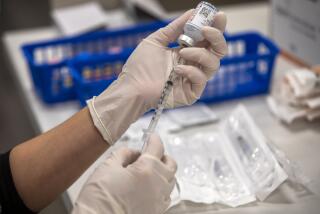Clinton to Set 10-Year AIDS Vaccine Goal
- Share via
WASHINGTON — President Clinton today plans to set a national goal of finding a vaccine to prevent AIDS within 10 years and will pledge new efforts by the federal government to make it happen, administration officials said.
In a speech to be delivered this morning, Clinton will liken the search for a vaccine to immunize people against HIV, the virus that causes AIDS, to John F. Kennedy’s challenge in the early 1960s to put a man on the moon by the end of that decade, according to people familiar with early drafts of his text.
Worldwide, 3 million people are newly infected with HIV annually, and an estimated 29 million people now carry the virus.
To reach this ambitious end, Clinton is announcing some comparatively modest means. The most concrete is the creation of a new AIDS vaccine research center at the National Institutes of Health in Bethesda, Md. The new center, according to an administration official, would start with about 30 to 50 researchers drawn from existing NIH programs, with the expectation that additional staff would be hired over time.
In addition, Clinton plans to appeal for more international cooperation in the fight against AIDS and to announce that he will launch a new campaign for more coordinated research among leading industrialized nations when he hosts them at the “Summit of the Eight” gathering in Denver next month. Clinton, aides said, also will urge drug companies to step up their efforts to develop an AIDS vaccine; critics have said the firms have been slow to invest resources in vaccine development.
Clinton will make his announcement at commencement exercises for Morgan State University in Baltimore, in a speech that is broadly devoted to the possibilities and perils created by the accelerating rush of science.
Addressing a phenomenon Clinton puts in the latter category, he will also call on Congress to pass legislation that would make it illegal for insurance companies to deny coverage to individuals, set premiums or otherwise impose adverse consequences on people as a result of genetic tests.
More to Read
Sign up for Essential California
The most important California stories and recommendations in your inbox every morning.
You may occasionally receive promotional content from the Los Angeles Times.










